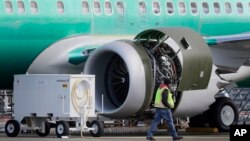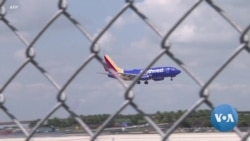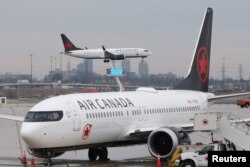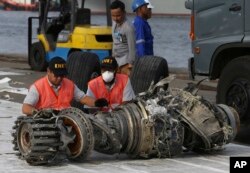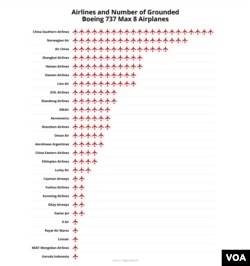Belatedly following the lead of more than 30 other countries, the U.S. Federal Aviation Administration has ordered the immediate grounding of the entire Max series of Boeing jetliners.
The action to halt all flights of the new planes in American airspace is a quick and sudden reversal of the stance taken by the manufacturer, the U.S. airlines flying them and the administration of U.S. President Donald Trump that there was no reason to order a grounding despite fatal nose-dive crashes of the Max planes in Indonesia and Ethiopia.
"I didn't want to take any chances," Trump replied when asked by reporters in the White House Roosevelt Room after he announced Wednesday afternoon that all the newer 737 variants would stop flying temporarily. "We just felt it was the right thing to do."
WATCH: Trump Hopes Grounding Won't Last Long
The action was "a very tough decision from the standpoint of a company of Boeing," added Trump, contending that while he could have further delayed the decision, "I felt it was important both psychologically and in a lot of ways."
The president cited “new information and physical evidence that we’ve received from the site and from other locations and through a couple of other complaints.”
Trump predicted Boeing will solve the problem: “Hopefully, they will very quickly come up with the answer. But until they do, the planes are grounded.”
The flight data recorder and cockpit voice recorder from the crashed Ethiopian Airlines flight arrived Thursday in France where they will be analyzed by the government’s BEA air accident investigation authority for more information about what caused the plane to go down.
WATCH: Trump Grounds Boeing Plane After Intense Pressure
Boeing, shortly after Trump concluded his remarks Wednesday, issued a statement saying that while it continues to have full confidence in the safety of its 737 Max series, it has determined, after consultation with the FAA, the U.S. National Transportation Safety Board and aviation authorities and its customers around the world, that “out of an abundance of caution and in order to reassure the flying public of the aircraft’s safety” it recommended a temporary suspension of operations of the entire global fleet, which totals nearly 400 planes.
Several U.S. carriers use the Max series: Southwest Airlines has 34 Max 8 planes in service; American Airlines has 24 and United Airlines has 14 planes of the slightly larger Max 9 version. Together those aircraft account for nearly 300 daily flights.
"We are doing everything we can to understand the cause of the accidents in partnership with the investigators, deploy safety enhancements, and help ensure this does not happen again," said Boeing CEO Dennis Muilenburg.
The FAA, in its statement, said the decision to ground the jets was made as a result of additional data gathered, as well as new evidence collected at the site and analyzed on Tuesday.
"This evidence, together with newly refined satellite data available to FAA this morning, led to this decision," according to the agency.
Canada, earlier Wednesday, temporarily banned flights of all Max 8 aircraft, which has crashed twice in fewer than five months, killing nearly 350 people.
That decision was made after receiving new satellite data that showed a possible similarity to the Ethiopian crash, Canadian Transport Minister Marc Garneau told reporters in Ottawa.
Canada's action followed confirmation that the pilot of Ethiopian Airlines Flight 302 reported internal control problems, while pilots in the U.S. filed at least five complaints in recent months about the aircraft model. Some of the anonymous complaints appear to involve the same anti-stall system, according to the FAA database.
Ethiopian Airlines spokesman Asrat Begashaw said the pilot asked to return to Addis Ababa, where the flight had departed. "In fact, he was allowed to turn back," Begashaw told the Reuters news agency.
Muilenburg confirmed the pilot's problems in interviews with The Wall Street Journal and CNN.
The Trump administration had continued to resist growing domestic and international calls to ground the 737 Max 8, even as Trump discussed the issue Tuesday in a phone call with Muilenburg. The Boeing executive reassured Trump the aircraft is safe, the company and White House officials confirmed.
Muilenburg called Trump after the president complained Tuesday on Twitter that planes "are becoming far too complex to fly." The call was in the process of being scheduled before Tuesday. The two men have developed a relationship since Trump was elected.
Boeing lobby and donations
Boeing donated $1 million to Trump's inaugural fund and the two men met later at Trump's Mar-a-Lago resort in Florida to discuss the new Air Force One presidential aircraft that Boeing is constructing. Trump applauded Muilenburg last June at a National Space Council meeting, calling the CEO a "friend of mine. A great guy."
As a key military contractor, Boeing is a major lobbying force in Washington. Boeing spent $15 million on lobbying last year, according to the Center for Responsive Politics. Boeing also has close ties with the U.S. government, particularly with the Federal Aviation Administration.
After decades of using outside experts to certify the safety of aircraft, the FAA changed its approach in 2005 with the creation of a new program through which Boeing and other U.S. aircraft manufacturers could select their own employees to help certify their planes.
About two-thirds of the Boeing 737-Max 8, the company's newest plane, were pulled from service within two days of Sunday's crash.
U.S. House Transportation Committee Chairman Peter DeFazio has suggested the FAA could be conflicted by its roles as an aviation industry advocate and regulator. The U.S. Senate plans to conduct a hearing on airline safety.
Trump had resisted calls for the jet to be grounded until the cause of the crashes is found and planned modifications of software are installed for the aircraft's automatic anti-stall system, which may have played a role in both accidents.
The software fix is expected to take months, FAA officials said on Wednesday, although the agency's acting administrator, Daniel Elwell, said he does not know for how long the Max series will be grounded.
The initial crash of the Max 8 involved a Lion Air domestic flight in Indonesia on Oct. 29, 2018. The plane plunged into the Java Sea, killing all 189 people on board.
During Sunday's Ethiopian Airlines ill-fated flight, the plane nosedived minutes after take-off from Addis Ababa on an international flight to Nairobi, Kenya, according to witnesses.




